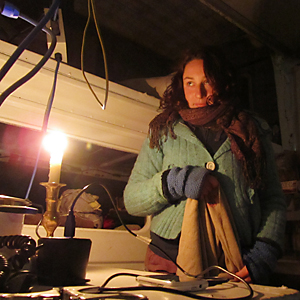Thursday 21st — Monday 25th May 2015, booking: www.buddhafield.com/gea

In just 10 weeks Buddhafield will bring you its third Green Earth Awakening Camp on the Blackdown Hills. The crew are preparing to welcome the volunteers that will help build and nurture this unique platform for creativity, community and insight.
Site Crew Needed
This is a community building exercise, not just work, work, work. We will spend nine days setting up, but you’ll be able to enjoy the event while it’s on. More information on the GEA volunteering page, or just drop us an email.
The Programme
What is it? A five day camp exploring how Buddhism can help us along the path towards community and sustainability. With green crafts, engaged dharma, social change, forest school, healing area and a daily timetable of workshops, talks, meditation, yoga, qi gong, dance and music. An intimate gathering to deepen into ourselves and a wider awareness. Tools for the mind, skills for our future.
What’s it about? Faced as we are by the threat of climate change, dwindling resources and violent conflict, it is important that we take to heart the need to transform ourselves and engage with the significant problems of the world, not from a reaction to them, but from a higher perspective of insight and love.
The theme for this year: Transform, Sustain, Thrive. By awakening our awareness we can engage in the world with a deepened presence and can begin to mindfully sustain ourselves in our daily lives, in community and in the wider world. By feeling the benefit of sustaining all life, we can become empowered to thrive.
“Fantastic — small, intimate, with rich variety of workshops both creative and informative.”
“So much on offer from fantastic, knowledgeable people.”
“Felt so safe to bring my daughters here and allow them free range.”
“The meditation area (on top of the hill) is the best site I have experienced at any festival /camp. Profound stillness.”
Here is a little taster of some of the delights to come …
Jamie Catto | www.jamiecatto.com
“We’re on a mission to make self-reflection hip for just a moment, just long enough to save us. If we can all collectively acknowledge our insanity, shrug and roll our eyes at each other at how nuts it is being a human, let alone having to pretend every day that we’re normal, the amount of energy we’ll inherit that has been wasted on the mask will be enough to creatively solve any global crisis.”
Jamie Catto, creator, producer/director of the multi-award winning global 1 Giant Leap films and albums and founder member of Faithless is now leading uniquely transformative workshops and one-on-one sessions. Drawing from the richly diverse wisdom, techniques and processes he has encountered during his ground-breaking filming, recording, philosophy voyages across all 5 continents, he is weaving these creative techniques and exercises to spark both Professional and Personal breakthroughs.
“Jamie Catto is a human icebreaker with a prow of determination and a motor of love, slicing through the frozen seas around us.” Tom Robbins
Heike Schroeder from The Tyndall Centre for Climate Change Research | www.tyndall.ac.uk
Dr Heike Schroeder is a Senior Lecturer and Course Director of the University of East Anglia’s MSc in Climate Change and International Development in the School of International Development. Heike teaches widely in the areas of climate change politics, globalisation and the environment, sustainability, environment and business, cities and climate change, natural resources and the environment, and forests, and co-leads a research theme of the Tyndall Centre for Climate Change Research. Heike’s research examines how national boundaries can be bridged to solve trans-national or global environmental problems, and how local, national, and international decisions differ in their abilities to solve environmental problems.
Mark Leonard from The Mindfulness Exchange | mindfulness-exchange.com
Before working with the Oxford Mindfulness Centre (OMC), Mark’s career explored means to manage natural resources sustainably. Around ten years ago he came to the conclusion that wisdom from Buddhist tradition would provide the means for achieving sustainable development if it could be applied in contemporary society. Through his involvement with the OMC, he has been able to realise his vision, applying the scientific understanding of mindfulness developed in Mindfulness-Based Cognitive Therapy (MBCT), to mindfulness training in the workplace with The Mindfulness Exchange.
Denise Rowe with Earthdances | www.earthdances.co.uk
Earth Dances arises from a fertile meeting ground between traditional and neo-traditional pan-African dance and non-stylised and environmental movement, drawing also on threads from Shiatsu, Aikido and Shamanic traditions.
These dance and movement forms share an implicit commonality: They are dances in connection with the cosmos, they are the awakening of the whole being in relation with environment and the awakening of the body-in-movement’s wisdom, a wisdom that arises when being is awake to itself.
Groundspring Network and Landworkers Alliance | landworkersalliance.org.uk
Calling all starter farmers, urban veg growers, beginner beekeeping collectives, CSAs, emerging dairyers, meat producers, educator….
We are a collective of entrant farmers, growers, woodsmen, beekeepers, cheese makers, mushroom pickers, and more. We are a burgeoning community spread across the UK, finding a bigger voice and new energy in coming together. We come from many different “camps”; organic/biodynamic/permaculture/forest gardening, some of us don’t subscribe to any particular camp, we are above all non-denominational. We are young and old in years. We work in both urban and rural landscapes. As individuals starting out in sustainable agriculture we are not isolated and alone, hopeless and surrounded by endless fields of industrial agriculture. We are already acting to build a resilient food system for our future. We are braced and booted and seek to be united.
And here are just some of the other workshops on offer…
- The Work That Reconnects
- Permaculture Principles and Design
- The Permaculture Association
- Growing Self Love
- Compassionate Communication
- Co-ops and Community
- Eco-Feminism
- Eco-Psychology
- Embodied Presence Contact Improvisation
- Nature Writing
- Building an Eco House
- Focusing
- Introduction to Buddhism
- Harmony Singing
- Storytelling
- Rhythms and Body Percussion
- Yoga
- Qi Gong
- Foraging
- Peg Loom Weaving
- Spoon Carving
- Felt Making
- Blacksmithing
- Basket Weaving
- Willow Dome Construction
- Drop Spindle
Keep checking our Facebook page for more updates.

 The Camp will feature a workshop programme of green crafts, offering the chance to make something beautiful with our own hands and learn new but traditional skills; social change workshops and ecology talks, helping us to face difficult truths about ourselves and the world; Meditation, Rituals and Dharma talks giving us the spiritual context in which to explore those truths and help us grow and change together. We all can become what the world needs now — alive, aware, in touch with the earth, connected.
The Camp will feature a workshop programme of green crafts, offering the chance to make something beautiful with our own hands and learn new but traditional skills; social change workshops and ecology talks, helping us to face difficult truths about ourselves and the world; Meditation, Rituals and Dharma talks giving us the spiritual context in which to explore those truths and help us grow and change together. We all can become what the world needs now — alive, aware, in touch with the earth, connected.


